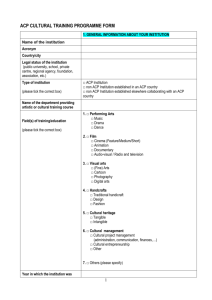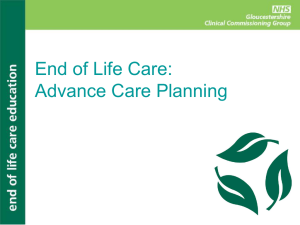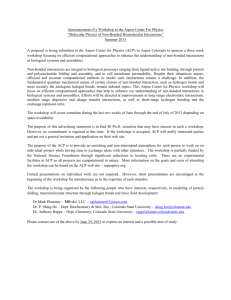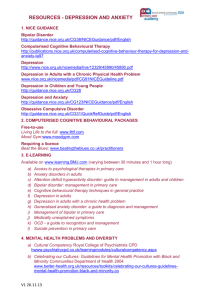1 - Association of Child Psychotherapists
advertisement
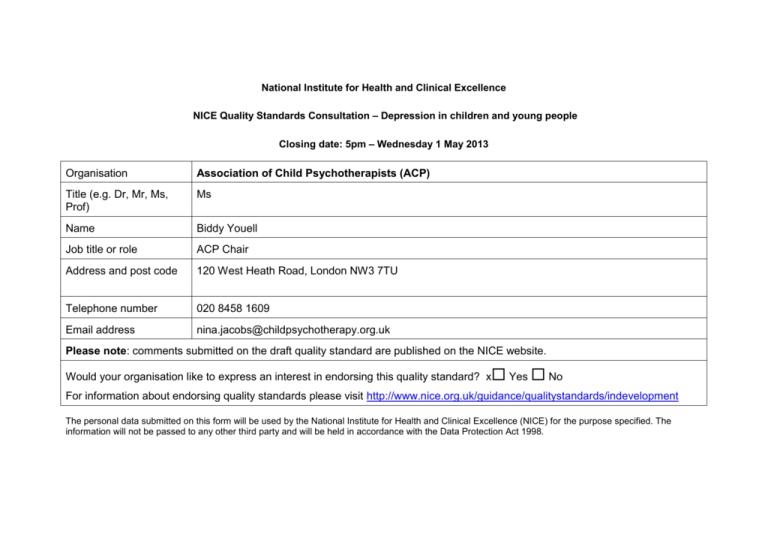
National Institute for Health and Clinical Excellence NICE Quality Standards Consultation – Depression in children and young people Closing date: 5pm – Wednesday 1 May 2013 Organisation Association of Child Psychotherapists (ACP) Title (e.g. Dr, Mr, Ms, Prof) Ms Name Biddy Youell Job title or role ACP Chair Address and post code 120 West Heath Road, London NW3 7TU Telephone number 020 8458 1609 Email address nina.jacobs@childpsychotherapy.org.uk Please note: comments submitted on the draft quality standard are published on the NICE website. Would your organisation like to express an interest in endorsing this quality standard? x Yes No For information about endorsing quality standards please visit http://www.nice.org.uk/guidance/qualitystandards/indevelopment The personal data submitted on this form will be used by the National Institute for Health and Clinical Excellence (NICE) for the purpose specified. The information will not be passed to any other third party and will be held in accordance with the Data Protection Act 1998. Please provide comments on the draft quality standard on the form below, putting each new comment in a new row. When feeding back, please note the section you are commenting on (for example, section 1 Introduction). If commenting on a specific quality statement, please indicate the particular sub-section (for example, statement, measure or audience descriptor). If your comment relates to the standard as a whole then please put ‘general’. In order to guide your comments, please refer to the general points for consideration on the NICE website as well as the specific questions detailed within the quality standard. Please add rows as necessary. Comments Section e.g. Section 1 Introduction or quality statement 1 (measure) Draft quality statement 5: Monitoring progress Draft quality statement 6: Psychological and pharmacological e.g. Comment about quality statement 1. Within this statement is a specification that a validated outcome measure should be used at every appointment - the ACP feels this seems to go beyond what even Children and Young People’s IAPT is recommending i.e. that there should be regular and routine on-going outcome monitoring - not necessarily every meeting. With regards to the section “Children and young people receiving treatment for depression answer a set of standard questions at each appointment to check that the treatment is working” - the ACP understands the pressure in the current climate for session by session outcome monitoring. However the ACP supports the idea of monitoring the progress of psychological interventions, but feels that the idea of asking “standard questions” repeatedly to adolescents may not always be well received by these young clients and that the very nature of their therapeutic treatment, involving highly charged emotional issues, may not fit in with this approach to ascertain how much progess is being made. A degree of flexibility in how this quality statement is worded could be of great clinical value. When describing the range of therapies that should be available, there is no reference to section 1.6.3 of the guidance (NICE clinical guideline 28) which refers to depression unresponsive to combined treatment. In that section, 1.6.3.2 “Following multidisciplinary review, the following should be considered: an alternative psychological therapy which has not been tried previously (individual CBT, interpersonal therapy or shorter-term therapy, of at least three months’ duration), or systemic Section therapies (pg 15) Comments family therapy (at least 15 fortnightly sessions), or individual child psychotherapy (approximately 30 weekly sessions).” Without this section being referred to, there is no reference to psychodynamic child therapy as a recommended treatment within the quality standards at all - and therefore no expectation that services should make this form of treatment available. Given that this is part of the treatment recommendations for moderate/severe depression - and that there is a major NIHR study (the IMPACT Study) now taking place to investigate this recommendation further - the ACP feels that a strong case needs to be made that this element of the NICE guidance is not ‘dropped’ from the quality assurance document. With regards to the section “Children and young people with depression are offered a talking therapy that best suits them” and the “full range” - the ACP feels that IMPACT experience has heightened awareness that the necessary therapeutic alliance involves very careful attention to what works for whom. The ACP feels that both CBT and STPP therapists have had cases they feel sure would have been better seen in each other’s modalities, and that it is therefore important to hold in mind the principle that evidence based practice is decision-making based on the judicious combination of: a) the best available evidence; b) the client’s preferences; and c) the clinical judgement of the practitioner. Statement-specific It should be noted that while there are tight time limits for “assessment”, there seems no guidance about waiting times for questions for treatment. The ACP feels this is a major issue. Initial impressions from the on-going IMPACT Study suggests that cases that consultation: (page 3) waited longer than they should have done, due to a lack of resources, were harder to engage/hold in therapy. Although we welcome the setting of targets for initial assessment, the process of assessment is not always therapeutic in itself, and so we would support guidance on waiting times for treatment, especially in cases of more severe depression. Draft quality The ACP welcomes the commitment to the greater identification of depression in young people, given the evidence of statement 1: relatively low-levels of detection, especially among adolescent boys. The ACP would like to indicate that the quality Diagnostic tools (pg standards will be highly dependant on the level of training among professionals. The ACP would also like to draw attention to 4-5) the pervasiveness of co-morbidity among depressed young people and how much more complex this makes diagnosis. General The ACP would like to make reference to Parent Work: Whether one’s understanding of depression is biologically based or psychological, or both, the fact is that depression is most often not confined to only one family member, and the young person’s experience of depression is best helped and managed by the parents if their own emotional capacities for noticing, Section Comments thinking about, tolerating, and managing their young person’s depression is well supported and enhanced through the provision of support to parents, alongside therapeutic work with the depressed young person. Section Comments Closing date: Please forward this electronically by 5pm on Wednesday 1 May 2013 at the very latest to QSconsultations@nice.org.uk PLEASE NOTE: The Institute reserves the right to summarise and edit comments received during consultations, or not to publish them at all, where in the reasonable opinion of the Institute, the comments are voluminous, publication would be unlawful or publication would be otherwise inappropriate.

